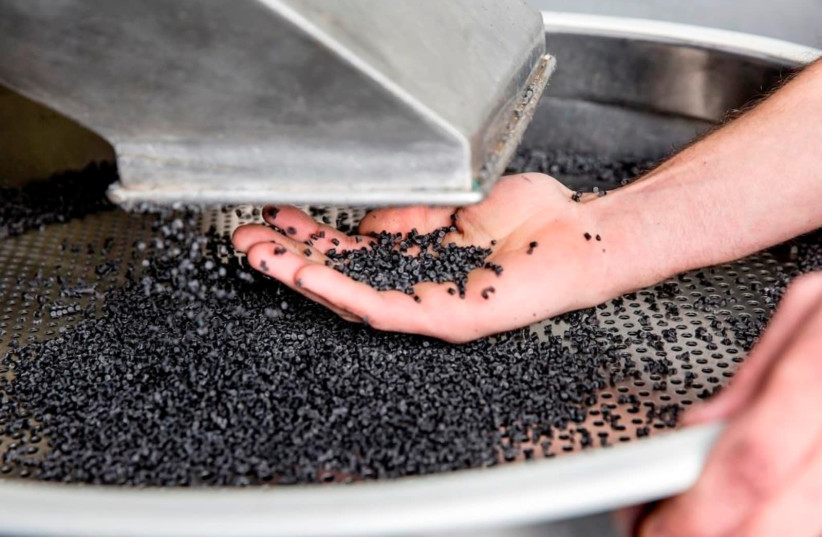UBQ Materials converts trash into treasure with patented process it hopes will be adopted worldwide.
By MAYA MARGIT/THE MEDIA LINE NOVEMBER 24, 2020 12:20

An Israeli company has found a creative solution to the mounds of discarded single-use COVID-19 protection gear that is littering beaches, ocean floors and cities around the world.
Demonstrating how one man’s trash is another man’s treasure, UBQ Materials converts face masks, gloves and other personal protective equipment (PPE) into an alternative form of recyclable plastic.
The company processes nearly 30 tons of garbage each week at its factory in the southern Israeli kibbutz of Ze’elim. Its innovative process can turn all types of household waste — everything from diapers, food, plastic bags and masks — into a durable and sustainable material that costs roughly the same as conventional polymers.
“This [mask] is unwoven plastic,” Jack (Tato) Bigio, co-founder and chief executive officer of UBQ Materials Israel, told The Media Line as he held up a standard surgical mask during a recent tour of the company’s plant.
“It is a material that you cannot recycle as is, and therefore, it will typically end up in landfills,” he added.
There are growing concerns among environmentalists about coronavirus-related single-use items and the threat they may pose to wildlife.
The Marine Conservation Society, a UK-based environmental group that organizes the annual Great British Beach Clean, recently reported finding discarded face masks and gloves on nearly 30% of the beaches. In addition, it found common PPE on the ground in 69% of inland litter clean-ups.
UBQ’s factory, which partially runs on solar power, is the first in the world that can recycle every kind of waste to create an entirely new composite material.“
Mixing everything through this process and creating a homogeneous thermoplastic can replace common plastics in the production of end products,” Bigio said. “Instead of making it out of oil, like polypropylene or polyethylene, our material is made out of trash.”
Every ton of UBQ Material used prevents up to 15 tons of CO2e, or carbon-dioxide equivalent, from being released into the atmosphere. Each year, the company produces 5,000 tons of material.
According to the United States Environmental Protection Agency (EPA), municipal solid-waste (MSW) landfills were the third-largest source of human-related methane emissions in the United States and caused roughly 15.1 percent of these emissions in 2018. Landfill emissions represent an untapped energy source and proper waste management could therefore be critical in addressing pressing climate-change challenges.
UBQ’s patented process first reduces raw trash into its basic natural components, treats it and then processes it, resulting in pellets that are shipped to plastics manufacturers around the world. The pellets can be mixed with regular plastic pellets to make everything from boxes and trays to hangers and automotive parts.
Earlier this month, UBQ announced a partnership with Mainetti, one of the world’s largest full-service retail suppliers that produces billions of clothes hangers a year.
n recent months the Israeli company has inked deals with major brands and manufacturers across the globe.“
McDonald’s is using our material for their trays and now we’re exploring other products for their branches,” Bigio said, adding that Daimler AG, the owner of Mercedes-Benz, recently partnered with UBQ to manufacture automotive parts. “
We don’t use any water, we don’t have any sludge, we don’t create any emissions and we use 100% of the waste,” Bigio said.
The factory’s 32-person team comes from various communities and towns around Ze’elim, which is near some of Israel’s largest landfills. Thanks to UBQ, which processes all of the kibbutz’s household waste, Ze’elim was one of the world’s first communities to be zero-waste.
“I worked all my life in the plastic industry, creating the problems, and now I’m solving the problems,” UBQ Materials Israel Chief Operations Officer Gil Felus told The Media Line.“
I believe that we can scale up and copy paste this factory all around the globe to help reduce the amount of waste,” he said.
Finding a solution to the world’s growing hunger for plastic is a daunting task. Nearly 360 million metric tons of plastic were produced globally as of 2018, a report released by the Statista statistics-database website shows. That number is expected to quadruple to more than 1.35 billion tons by 2050.
UBQ says that it is prepared to meet that challenge. It is developing a plant in the Netherlands and plans to build a factory in the United States in the near future.
“For us, waste is a locally available natural resource; for others it’s a problem,” Bigio said.
By “avoiding landfill waste, we are basically helping the planet and by creating a new natural resource, we’re leaving more resources for future generations,” he said.
